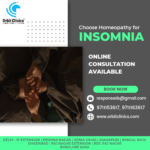(The Vicious Cycle That Keeps You Awake)

Written by
Dr. Deepak Sharma
BHMS, MD, Ph.D. (Scholar)
Homeopathic Physician and Educator
Founder – Orbit Clinics
Introduction:
In today’s fast-paced world, the internet has become an integral part of our daily lives. From communication to entertainment and work, it’s hard to imagine life without the convenience it offers. However, this ever-growing digital landscape has also brought with it the dark cloud of insomnia. The connection between internet usage and sleep deprivation is undeniable and has become a public health concern. In this article, we will explore the intricate relationship between insomnia and the internet, as well as the factors that contribute to this vicious cycle.
The Blue Light Effect:
One of the most significant factors contributing to internet-induced insomnia is the blue light emitted by screens. This high-energy visible light has the ability to suppress melatonin production, a hormone responsible for regulating sleep. When melatonin production is disrupted, our circadian rhythm, or internal body clock, is thrown off balance, making it difficult to fall asleep and maintain a regular sleep pattern.
The Impact of Social Media and FOMO:
Social media has revolutionized the way we interact with others, offering us the opportunity to stay connected 24/7. However, the constant need to check social media feeds, driven by the Fear of Missing Out (FOMO), can lead to sleep deprivation. As we scroll through endless streams of information and updates, our brains become overstimulated, making it difficult to switch off and relax when it’s time for bed.
Work-Life Imbalance:
The internet has facilitated an always-on work culture, where employees often find themselves tethered to their devices, responding to emails and messages well into the night. This can blur the lines between work and leisure, leading to increased stress and a lack of downtime, which can significantly impact sleep quality.
The Information Overload:
The internet is an infinite source of information, offering users access to news, articles, and multimedia content from around the world. With so much information at our fingertips, it’s easy to fall into the trap of information overload. Consuming too much information, especially before bedtime, can lead to mental fatigue and an inability to wind down and relax, thus exacerbating insomnia.
Breaking the Cycle: Tips for Better Sleep:
To combat the negative effects of the internet on sleep, it’s crucial to establish healthy boundaries and habits. Here are some tips to help you break the cycle of insomnia:
- Establish a digital curfew: Set a specific time each night to disconnect from electronic devices and allow your brain to wind down before bed.
- Create a sleep-friendly environment: Make your bedroom a sanctuary for sleep by keeping it cool, dark, and quiet. Avoid using electronic devices in bed and consider investing in blackout curtains or a white noise machine.
- Be mindful of your screen time: Limit your exposure to screens throughout the day, especially during the hours leading up to bedtime.
- Practice relaxation techniques: Engage in calming activities such as reading a book, meditating, or taking a warm bath before bed to help your mind and body relax.
- Set boundaries for work: Establish clear boundaries between work and leisure time to prevent work-related stress from seeping into your evenings and bedtime routine.
How Homeopathy can help?
For insomnia caused by overuse of the internet, homeopathy may offer some relief by addressing the underlying factors contributing to the sleep disturbance. A qualified homeopath will take a detailed history and consider the unique characteristics of your insomnia before prescribing a remedy.
Some common homeopathic remedies for insomnia related to internet overuse might include:
- Coffea Cruda: This remedy is derived from unroasted coffee beans and is often used for individuals who have difficulty falling asleep due to racing thoughts or an overactive mind.
- Nux Vomica: Made from the seeds of the Strychnos nux-vomica tree, this remedy is helpful for people who are irritable, anxious, or overly sensitive to stimuli. It may be useful for those who have difficulty falling asleep after prolonged internet use, as well as for those who wake up easily during the night.
- Ignatia Amara: Derived from the seeds of the St. Ignatius bean, this remedy is often used for emotional stress and anxiety, which can contribute to sleep disturbances.
- Kali Phosphoricum: Made from potassium phosphate, this remedy is recommended for individuals who are mentally exhausted and have difficulty sleeping as a result.
- Passiflora Incarnata: This remedy is made from the passionflower plant and is often used for individuals who experience restless sleep, nightmares, or difficulty falling asleep due to nervousness or anxiety.
Conclusion:
In conclusion, the ever-expanding digital landscape has significantly impacted our sleep patterns, leading to a growing public health concern surrounding internet-induced insomnia. Factors such as the blue light effect, social media-driven FOMO, work-life imbalance, and information overload contribute to this vicious cycle. To break free from this cycle, it is essential to establish healthy habits and boundaries that promote better sleep, such as setting a digital curfew, creating a sleep-friendly environment, limiting screen time, practicing relaxation techniques, and setting clear boundaries between work and leisure. In addition, homeopathy may offer potential relief by addressing the underlying factors contributing to sleep disturbances. By taking proactive steps to manage our internet usage and prioritize sleep, we can combat the negative effects of the digital world on our overall well-being.
References:
- Cajochen, C., Frey, S., Anders, D., Späti, J., Bues, M., Pross, A., … & Stefani, O. (2011). Evening exposure to a light-emitting diodes (LED)-backlit computer screen affects circadian physiology and cognitive performance. Journal of Applied Physiology, 110(5), 1432-1438.
- Lemola, S., Perkinson-Gloor, N., Brand, S., Dewald-Kaufmann, J. F., & Grob, A. (2015). Adolescents’ electronic media use at night, sleep disturbance, and depressive symptoms in the smartphone age. Journal of Youth and Adolescence, 44(2), 405-418.
- Al-Menayes, J. J. (2015). The fear of missing out scale: Validation of the Arabic version and correlation with social media addiction. International Journal of Applied Psychology, 5(2), 41-46.
- Lanaj, K., Johnson, R. E., & Barnes, C. M. (2014). Beginning the workday yet already depleted? Consequences of late-night smartphone use and sleep. Organizational Behavior and Human Decision Processes, 124(1), 11-23.
- Eppler, M. J., & Mengis, J. (2004). The concept of information overload: A review of literature from organization science, accounting, marketing, MIS, and related disciplines. The Information Society, 20(5), 325-344.
- Hawley, G., Horwitz, P., & Kogan, R. (2018). The effects of technology usage on sleep quality: A literature review. Sleep Medicine Reviews, 39, 126-135.
- Bell, I. R., Howerter, A., Jackson, N., Aickin, M., Bootzin, R. R., & Brooks, A. J. (2011). Effects of homeopathic medicines on polysomnographic sleep of young adults with histories of coffee-related insomnia. Sleep Medicine, 12(5), 505-511.
- Dhawan, K., Dhawan, S., & Chhabra, S. (2004). Passiflora: A review update. Journal of Ethnopharmacology, 94(1), 1-23.




